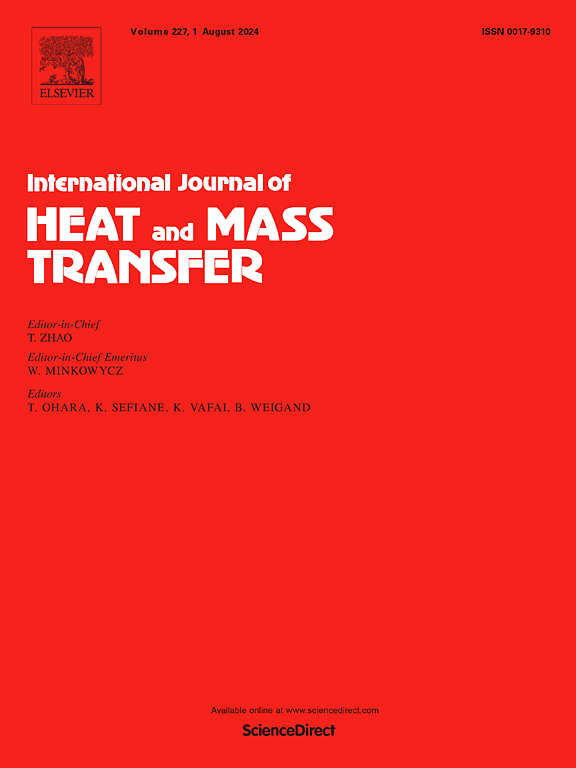Characterization of semi-open liquid desiccant cycle energy efficiency in ventilation air treatment
IF 5
2区 工程技术
Q1 ENGINEERING, MECHANICAL
International Journal of Heat and Mass Transfer
Pub Date : 2025-04-08
DOI:10.1016/j.ijheatmasstransfer.2025.127061
引用次数: 0
Abstract
Efficient moisture removal from air without subcooling using liquid desiccants represents a major advancement in energy-efficient cooling, particularly through the separate sensible and latent cooling (SSLC) process. However, developing a high-performance, robust liquid desiccant dehumidification cycle remains challenging. Traditional open desiccant cycles rely on outdoor air to remove moisture from the desiccant solution in the regenerator, but this also extracts significant sensible heat, reducing overall efficiency. This study investigates a semi-open absorption cycle that eliminates the need for scavenging air, addressing a key inefficiency of conventional systems. An experimental system was tested under varying outdoor air conditions, demonstrating substantial performance improvements. The semi-open cycle significantly reduced sensible heat loss compared to traditional systems while maintaining strong moisture removal capabilities. Notably, it achieved a dehumidification coefficient of performance (COP) of up to 0.9, with peak latent cooling capacity observed at higher inlet air dew points. These findings underscore the semi-open cycle's potential for enhancing energy efficiency in dehumidification, particularly in regions with high latent loads.
通风空气处理中半开式液体干燥剂循环能效的表征
使用液体干燥剂在没有过冷的情况下有效地从空气中去除水分代表了节能冷却的重大进步,特别是通过单独的显冷和潜冷(SSLC)过程。然而,开发高性能,强大的液体干燥剂除湿循环仍然具有挑战性。传统的开放式干燥剂循环依靠室外空气从再生器中的干燥剂溶液中去除水分,但这也会提取显热,降低整体效率。本研究探讨了一种半开放的吸收循环,消除了清除空气的需要,解决了传统系统效率低下的一个关键问题。实验系统在不同的室外空气条件下进行了测试,显示出实质性的性能改进。与传统系统相比,半开式循环显着减少了显热损失,同时保持了强大的除湿能力。值得注意的是,它实现了除湿性能系数(COP)高达0.9,在较高的进口空气露点处观察到峰值潜在制冷量。这些发现强调了半开放式循环在提高除湿能效方面的潜力,特别是在潜在负荷高的地区。
本文章由计算机程序翻译,如有差异,请以英文原文为准。
求助全文
约1分钟内获得全文
求助全文
来源期刊
CiteScore
10.30
自引率
13.50%
发文量
1319
审稿时长
41 days
期刊介绍:
International Journal of Heat and Mass Transfer is the vehicle for the exchange of basic ideas in heat and mass transfer between research workers and engineers throughout the world. It focuses on both analytical and experimental research, with an emphasis on contributions which increase the basic understanding of transfer processes and their application to engineering problems.
Topics include:
-New methods of measuring and/or correlating transport-property data
-Energy engineering
-Environmental applications of heat and/or mass transfer

 求助内容:
求助内容: 应助结果提醒方式:
应助结果提醒方式:


